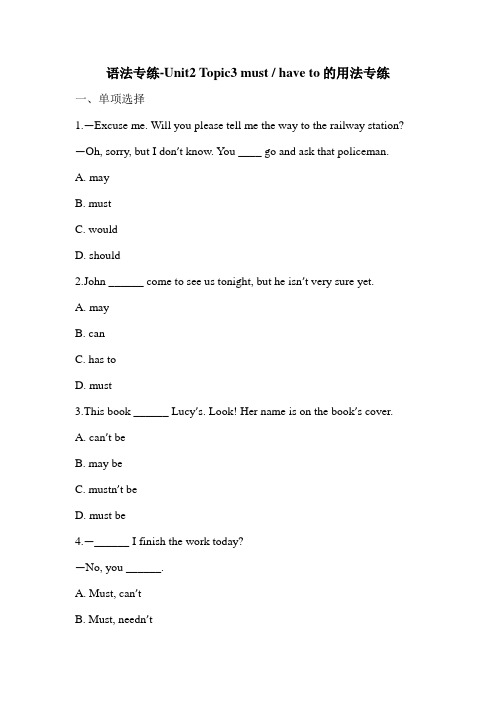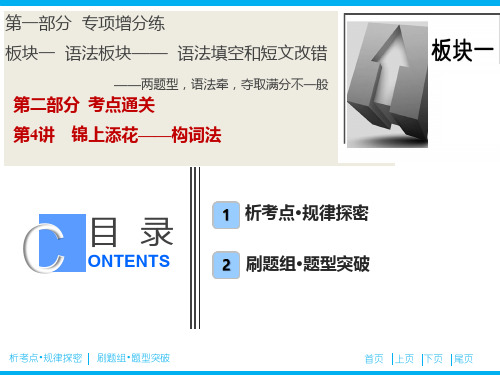语法专练 板块2 第3讲 构词法
- 格式:doc
- 大小:228.50 KB
- 文档页数:13



高考英语二轮语法巩固-《构词法》专题讲练【正误比对】词性的误用(1)【误】You'd better take account of your able accurately before attempting to do such a business.【正】You'd better take account of your ability accurately before attempting to do such a business.[分析] able改为ability。
根据your可知此处应用名词ability,表示“能力”。
句意:你最好在尝试做这笔生意前准确地考虑一下自己的能力。
(2)【误】I was supposed to arrive at the airport on time. Unfortunate, I was held up by the heavy traffic jam.【正】I was supposed to arrive at the airport on time. Unfortunately,I was held up by the heavy traffic jam.[分析] Unfortunate改为Unfortunately。
修饰整个句子作状语应用副词,根据句意可知应表示“不幸的是”,故将Unfortunate改为Unfortunately。
(3)【误】Excellent oral and written communication skills in Chinese and English are of important.【正】Excellent oral and written communication skills in Chinese and English are of importance.[分析] important改为importance。


高考英语一轮复习语法填空专题应对策略专题22 构词法1.转化法动词→名词Let’s go out for a walk.我们出去散闲逛吧。
(walk)名词→动词We lunched at White’s. 我们在怀特家吃午饭。
(lunched)形容词→动词Culture has furthered the advance of language.文化促进了语言的进展。
(has furthered)2.合成法合成名词如:bookmark (书签);guidebook (指南手册);workshop (研讨会;车间);sunset (日落)合成形容词如:lifelong (终身的;毕生的);heartbreaking (令人心碎的);absent-minded (心不在焉的)合成动词如:whitewash (用石灰水刷白);overcome (战胜);overthrow (推翻)合成副词如:anyway (无论如何);everywhere (处处);however (尽管如此);forever (永久)合成介词如:inside (在……里);outside (在……外);throughout (遍及);within (在……之内)3.混合法如:smog (smoke + fog) 烟雾;brunch (breakfast + lunch) 早午餐;newscast (news + broadcast) 新闻广播; faction (fact + fiction ) 纪实文学;sci-fi (science + fiction) 科幻小说;docudrama (document + drama) 纪实电影4.缩略法如:television→ TV (读字母音)电视;very important person→ VIP (读字母音)贵宾;Testing of English as aForeign Language→ TOEFL(作为一个单词读音)托福5.派生法1)前缀表否定1.dis-如:ability→ disability (无力量; 残疾);agree→ disagree (意见不全都);appear→ disappear (消逝)2.un-如:dress→ undress (除去……的衣服); lock→ unlock (开锁);fold→ unfold (开放;显露)3.in-, il-, im-, ir-如:accurate→ inaccurate (不精确的);legal→ illegal (不合法的);polite→ impolite (不礼貌的);possible→ impossible (不行能的); regular→ irregular (不规章的)4.mis-如:behave→ misbehave (行为不端);understand→ misunderstand (误会);fortune→ misfortune (不幸)5.non-如:a non-drinker不喝酒的人;non-existence不存在;non-smoking非吸烟(区)6.表重复re-如:arrange→ rearrange (重新支配);consider→ reconsider (重新考虑);create→ recreate (重现;重建)7.表动化en-如:able→ enable (使能够);large→ enlarge (扩大);rich→ enrich (使充实)2)后缀表示人1.-er 如:buy→ buyer (买主,购买者); design→ designer (设计者);dance→ dancer (舞者)2.-or 如:act→ actor (男演员); invent→ inventor (创造者);direct→ director (指导者; 导演)3.-ee 如:employ→ employee (受雇者,雇员); interview→ interviewee (被采访者;被面试者)4.-ist 如:art→ artist (艺术家,美术家); special→ specialist (专家);violin→ violinist (小提琴演奏家)5.-ian 如:music→ musician (音乐家; 乐师); politics→ politician (政治家)6.-ant 如:account→ accountant (会计);assist→ assistant (助手); serve→ servant (仆人;佣人)7.-ess或woman如:god→ goddess (女神);poet→ poetess (女诗人);policeman→ policewoman(女警察)2)名词后缀1.-ness 如:awkward→ awkwardness(笨拙; 尴尬);careless→ carelessness(马虎)2.-ment 如:achieve→ achievement (成就; 达成); accomplish→ accomplishment (成就;成果)3.-al 如:approve→ approval (赞成; 批准);arrive→ arrival (到达);survive→ survival (存活;幸存)4.-tion 如:attract→ attraction (吸引);collect→ collection (保藏品);connect→ connection (联系; 连接物)5.-(ss)ion 如:discuss→ discussion (争辩); express→ expression (表情); admit→ admission (入场费;准入)6.-ance 如:accept→ acceptance (接受); appear→ appearance (消灭; 外表); assist→ assistance (挂念)7.-ence 如:depend→ dependence (信任, 依靠); differ→ difference (差异); exist→ existence (存在;生存)8.-ture 如:mix→ mixture (混合;混合物); fail→ failure (失败; 没做到); press→ pressure (压力)9.-y 如:recover→ recovery (恢复, 痊愈); deliver→ delivery (递送,投递); discover→ discovery (发觉)10.名词后缀-(i)ty 如:electric→ electricity (电); equal→ equality (同等; 公平); safe→ safety (平安)3).动词后缀-en 如:length→ lengthen (使)变长, 延长; strength→ strengthen (加强);fright→ frighten (恐吓)4).形容词后缀-en 如:gold→ golden (金制的);wood→ wooden (木制的)考点考法关于充当句中各成分的最典型的词类,请记住以下三条:1.作主语或宾语要用名词;2.作定语、表语或补足语一般用形容词;3.修饰动词、形容词或另一副词,作状语,用副词。

构词法英语的构词法大致分三类:合成词,转化词,派生词一.合成词,也叫复合词,由两个或两个以上的单词构成一个词。
合成的方式很多,常见的有1) 名词+名词homework basketball2) 副词+名词upstairs downstairs3) 副词+动词download4) 名词+形容词homesick worldfamous二.派生词。
由单词加前缀或后缀构成。
几种常见的前后缀。
1) re-表示再。
Rewrite , reuse , recycle2) im(n)—表示无,不incorrect,impossible ,impolite3) un--表示无,不。
Untrue,unhappy ,uncomfortable4) dis--表示无,不dishonest, disagree, dislike5) anti—表示反对,antiwar antipollution6) –able 表示可能,易于,适合于lavable comfortable reusable7) –ful 表示充满的……,具有……性质helpful hopeful careful8) –less, 表示少的,不足的helpless, useless careless三.转化词由由一个词类转化另一词类,词形不变。
Rain 名词雨动词下雨直接引语和间接引语一定义:直接引语:直接引述别人的话,直接引语有引号,引号内的叫引语。
引号外的叫引述动词,引语可以放在引述动词前,也可以放在引述动词后。
间接引语:用自己的话转述别人的话叫间接引语。
间接引语没有引号,在大多数情况下构成宾语从句。
She said : “I’m going to the market”. She said she was going to the market .二.陈述句的转述。
直接引语如果是一个陈述句,变间接引语时用that,that在口语中常常省略,间接引语的人称时态指示代词时间状语都要做相应的变化。
2013高考英语:(02)二轮语法学案(构词法)(训练题配答案或解析)构词法(一)本单元的语法重点是构词法。
语言最基本的要素之一是词汇,在日常生活中人们使用的是少量而又简单的词汇,这些词表示简单的事物和概念。
这些词是语言中最基本的词.在语言上称为原生词(primitives).也叫基本词或根词,随着语言的发展,原有的词已不够用,人们便按照一定的规律创造新词,称之为构词法(word forrfiation)。
英语中的构词法有以下几种:1.转化法:把一个单词由一种词类转化成另一种词类的方法。
book(书)→to book(订购) 名词→动词 correct(正确的)→to correct(改正) 形容词一动词 native(本地的)→native(本地人) 形容词一名词2.合成法:把两个或两个以上的词组成一个新词叫合成法。
Broadband=broad+band(宽带) mankind=man+kind(人类)3.缩略法:把一个词缩短,不增减意义.也不改变意义。
hi—teeh=high+technology(高科技)e-school=electronic school网上学校IT=Information technology信息技术CSA=Chinese Space Agency中国太空机构4.缀合法:由词根加前缀、后缀构成新词的方法。
dis-honest→dishonest不诚实的extreme→lyextremely特别地un=…end—ly→unfriendlv不友好的特别提醒:一些常见的前缀(1)co-一together/with共同.一起coworker合作者cooperate共同合作(2)super—more than usual超过supermarket超市supernature超自然superheat过热(3)trans across移上.转上,在那一边translate翻译,转写transformer转变器,使变化的人(物)(4)tele:far远的telegraph电报telescope望远镜(5)sub=under在……下的subway地铁(6)bio=life有生命的brography传记(7)否定前缀: dis=agree同意disagree不同意appear出现disappear消失 cover 覆盖discover发现Un=able能够 unable不能 fair公平的unfair不公平的limited有限的un=limited无限的tie系上 untie解开in=complete完全的 incomplete不完全的 correct正确的 incorrect不正确的im=possible可能的 impossible不可能的patient耐心的 impatient不耐烦的non=stop停止non-stop不停的 smoker吸烟者 non=smoker不吸烟者mis= understand理解 misunderstand误解考题根据构词法,猜测下列画线词的含义(1) My cousin has an excellent voice. Her dream is to be-come a superstar.A.超人 B.大人物 C.超级明星 D.球星(2) It's important to learn how to cooperate with others.A.操作 B.动手术 C.控制 D.共同合作考题点拨:答案为(1)c super表示。
第1篇一、引言构词法是语言学中的一个重要分支,主要研究词的构成规律和构成方式。
在汉语中,构词法是构成词汇的基础,对于理解和使用汉语具有重要意义。
本文将介绍汉语中的三大构词法,即词根词缀法、词根词尾法和复合构词法。
二、词根词缀法1. 词根词根是构成词语的基本要素,通常由单个或多个音节组成,具有独立的意义。
词根是词语的“核心”,决定了词语的基本意义。
例如,“花”是词根,表示植物的开花部分;“学”是词根,表示学习、研究。
2. 词缀词缀是附加在词根上,用来表示词的语法意义或词义变化的词素。
词缀分为前缀、后缀和中缀。
汉语中的词缀主要是后缀,如“-子”、“-儿”、“-头”等。
(1)后缀后缀是附加在词根后面的词素,用来表示词的语法意义或词义变化。
例如:- 子:表示小、年轻,如“孩子”、“果子”;- 儿:表示小、可爱,如“花儿”、“鸟儿”;- 头:表示头部,如“石头”、“木头”。
(2)前缀前缀是附加在词根前面的词素,用来表示词的语法意义或词义变化。
例如:- 预:表示预先、事先,如“预测”、“预防”;- 无:表示没有,如“无边”、“无际”。
(3)中缀中缀是附加在词根中间的词素,汉语中较少使用。
例如:“玻璃”(表示透明、易碎的物体)。
3. 词根词缀法的运用词根词缀法是汉语中最常见的构词方式,以下是一些例子:- 词根+后缀:花儿、孩子、石头;- 词根+前缀:预测、预防、无边;- 词根+中缀:玻璃。
三、词根词尾法1. 词尾词尾是附加在词根后面的词素,用来表示词的语法意义或词义变化。
汉语中的词尾主要是后缀,如“-们”、“-们儿”、“-们头”等。
2. 词根词尾法的运用词根词尾法与词根词缀法类似,以下是一些例子:- 词根+词尾:孩子们、石头们、木头们头。
四、复合构词法1. 复合词复合词是由两个或两个以上的词组合而成的词语。
复合词分为并列式、偏正式、动宾式、主谓式等。
(1)并列式:表示并列关系,如“黑白”、“是非”;(2)偏正式:表示修饰与被修饰关系,如“高山”、“大桥”;(3)动宾式:表示动作与受动作对象的关系,如“写字”、“唱歌”;(4)主谓式:表示主语与谓语的关系,如“天气晴朗”、“人心惶惶”。
1 第3讲 构词法 [全国卷考情分析] 题型分类 典题试做 命题解读
语法填空 1.(2018·全国卷Ⅰ)To avoid knee pain, you can run on soft surfaces, do exercises to strengthen (strength) your leg muscles (肌肉), avoid hills and get good running shoes. Running is cheap, easy and it's always energetic (energy). 2.(2018·全国卷Ⅱ) A taste for meat is actually (actual) behind the change: An important part of its corn is used to feed chickens, pigs, and cattle. 3.(2018·全国卷Ⅱ)This switch has decreased pollution (pollute) in the country's major lakes and reservoirs and made drinking water safer for people. 1.给出形容词提示词,填写副词或名词; 2.给出动词,填写名词或形容词; 3.给出名词,填写形容词。
短文改错
1.(2018·全国卷Ⅰ)I felt happily that their life had improved.happily→happy 2.(2017·全国卷Ⅰ)It was a relief and I came to a suddenly stop just in the middle of the road.suddenly→sudden 3.(2017·全国卷Ⅱ)In their spare time,they are interesting in planting vegetables in their garden,which is on the rooftop of their house.interesting→interested 1.形容词和副词的互相错用; 2.形容词和名词的互相错用; 3.-ed与-ing形容词的互相错用。 2
考点一 形容词加ly变为副词的规律 [先试做题组] 单句语法填空 1.The boy ran quickly(quick) to school. 2.“What's that?” Father shouted angrily(angry). 3.The little girl is extremely(extreme)eager to know the result of the exam. 4.Your composition is badly(bad)organized.Please do your writing exercise more attentively(attend)next time. [再解读要点] 1.一般情况加ly。如:real→really;careful→carefully;polite→politely;quick→quickly 2.“辅音字母+y”结尾的,将y改为ily。如:angry→angrily;busy→busily;heavy→heavily 3.以ble结尾的,将ble改为bly。如:probable→probably;possible→possibly 4.个别单词,去掉e再加ly。如:true→truly 5.以ic结尾的,加ally。如:basic→basically;energetic→energetically [名师点津] 有的名词+ly→形容词,如:friend→friendly;day→daily 考点二 动词/名词变形容词的常见后缀 [先试做题组] Ⅰ.单句语法填空 1.He is rather selfish(self) so that nobody prefers to have a talk with him. 2.The good working condition in the factory is attractive(attract). 3
3.He is reliable(rely) so you can depend on him. 4.They are nervous(nerve) about their first trip abroad. 5.The flower is harmful(harm) to our health. Ⅱ.单句改错 6.Most people nowadays are so busy with their lives that they do not have time to enjoy a healthy and balance diet.balance→balanced 7.(2019·大庆调研)I don't think it a reason practice for them to behave that way in our society.reason→reasonable [再解读要点] 后缀 例词
able accept→acceptable可接受的 comfort→comfortable舒适的 fashion→fashionable时髦的
al music→musical音乐的 origin→original最初的 person→personal个人的;私人的
ful doubt→doubtful怀疑的 forget→forgetful健忘的 harm→harmful有害的
ible access→accessible容易取得的 horror→horrible可怕的;恐怖的 terror→terrible可怕的
ive effect→effective有效的;生效的 attract→attractive有吸引力的 impress→impressive给人深刻印象的
ous continue→continuous不断的;持续的 anxiety→anxious忧虑的 curiosity→curious好奇的 4
some tire→tiresome令人厌倦的 trouble→troublesome麻烦的
y taste→tasty美味的;可口的 health→healthy健康的 wealth→wealthy富裕的;丰富的 ern east→eastern东方的;向东的
ish child→childish孩子气的 fool→foolish愚蠢的;可笑的 self→selfish自私的
ic science→scientific科学的 economy→economic经济的 history→historic历史上著名的 ary imagine→imaginary想象中的 考点三 动词变名词的后缀 [先试做题组] Ⅰ.单句语法填空 1.(2019·泰安一模)It is necessary to have a physical examination (examine) every year. 2.Annan will be remembered for his ability and his warmth(warm). 3.Without hesitation(hesitate),I decided to follow them and we did have lots of fun that day. Ⅱ.单句改错 4.(2019·湖北八校联考)It is a very effective way to learn the language and improve your pronounce.pronounce→pronunciation [再解读要点] 后缀 例词
al approve→approval赞成;批准 arrive→arrival到来;到达 survive→survival幸存 ance ence appear→appearance出现;外貌
perform→performance表演;节目 5
exist→existence存在;生存 prefer→preference偏爱 ion tion ation
compete→competition比赛;竞争 invite→invitation邀请;请柬 explain→explanation解释
(ss)ion discuss→discussion讨论;辩论 decide→decision决定 admit→admission接纳;准许入学
ing hear→hearing听力;听觉 begin→beginning开始
ment achieve→achievement功绩;成就 argue→argument辩论;论据 treat→treatment对待;治疗
ure ture
fail→failure失败;没做到
press→pressure压力 mix→mixture混合;混合物
y recover→recovery恢复;痊愈 discover→discovery发现
其他 choose→choice选择 vary→variety多样化;种类 tend→tendency趋向;趋势 考点四 形容词变名词的后缀 [先试做题组] Ⅰ.单句语法填空 1.I'm doing Tom's job in his absence(absent). 2.How much is the postage(post)for the package. 3.He has the ability(able)to do the job. Ⅱ.单句改错 4.(2019·山师大附中月考)We fear that we do not have the strong and courage to face the truth of our situation.strong→strength